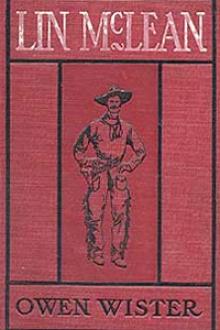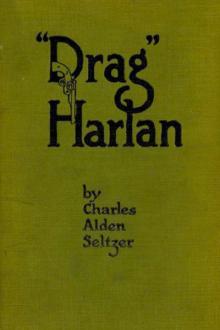The Jimmyjohn Boss, and Other Stories, Owen Wister [easy novels to read txt] 📗

- Author: Owen Wister
Book online «The Jimmyjohn Boss, and Other Stories, Owen Wister [easy novels to read txt] 📗». Author Owen Wister
I
It was thirty minutes before a June sundown at the post, and the first call had sounded for parade. Over in the barracks the two companies and the single troop lounged a moment longer, then laid their police literature down, and lifted their stocking feet from the beds to get ready. In the officers' quarters the captain rose regretfully from after-dinner digestion, and the three lieutenants sought their helmets with a sigh. Lieutenant Balwin had been dining an unconventional and impressive guest at the mess, and he now interrupted the anecdote which the guest was achieving with frontier deliberation.
“Make yourself comfortable,” he said. “I'll have to hear the rest about the half-breed when I get back.”
“There ain't no more—yet. He got my cash with his private poker deck that onced, and I'm fixing for to get his'n.”
Second call sounded; the lines filed out and formed, the sergeant of the guard and two privates took their station by the flag, and when battalion was formed the commanding officer, towering steeple-stiff beneath his plumes, received the adjutant's salute, ordered him to his post, and began drill. At all this the unconventional guest looked on comfortably from Lieutenant Balwin's porch.
“I doubt if I could put up with that there discipline all the week,” he mused. “Carry—arms! Present—Arms! I guess that's all I know of it.” The winking white line of gloves stirred his approval. “Pretty good that. Gosh, see the sun on them bayonets!”
The last note of retreat merged in the sonorous gun, and the flag shining in the light of evening slid down and rested upon the earth. The blue ranks marched to a single bugle—the post was short of men and officers—and the captain, with the released lieutenants, again sought digestion and cigars. Balwin returned to his guest, and together they watched the day forsake the plain. Presently the guest rose to take his leave. He looked old enough to be the father of the young officer, but he was a civilian, and the military man proceeded to give him excellent advice.
“Now don't get into trouble, Cutler.”
The slouch-shouldered scout rolled his quid gently, and smiled at his superior with indulgent regard.
“See here, Cutler, you have a highly unoccupied look about you this evening. I've been studying the customs of this population, and I've noted a fact or two.”
“Let 'em loose on me, sir.”
“Fact one: When any male inhabitant of Fort Laramie has a few spare moments, he hunts up a game of cards.”
“Well, sir, you've called the turn on me.”
“Fact two: At Fort Laramie a game of cards frequently ends in discussion.”
“Fact three: Mr. Calvin, in them discussions Jarvis Cutler has the last word. You put that in your census report alongside the other two.”
“Well, Cutler, if somebody's gun should happen to beat yours in an argument, I should have to hunt another wagon-master.”
“I'll not forget that. When was you expecting to pull out north?”
“Whenever the other companies get here. May be three days—may be three weeks.”
“Then I will have plenty time for a game to-night.”
With this slight dig of his civilian independence into the lieutenant's military ribs, the scout walked away, his long, lugubrious frockcoat (worn in honor of the mess) occasionally flapping open in the breeze, and giving a view of a belt richly fluted with cartridges, and the ivory handle of a pistol looking out of its holster. He got on his horse, crossed the flat, and struck out for the cabin of his sociable friends, Loomis and Kelley, on the hill. The open door and a light inside showed the company, and Cutler gave a grunt, for sitting on the table was the half-breed, the winner of his unavenged dollars. He rode slower, in order to think, and arriving at the corral below the cabin, tied his horse to the stump of a cottonwood. A few steps towards the door, and he wheeled on a sudden thought, and under cover of the night did a crafty something which to the pony was altogether unaccountable. He unloosed both front and rear cinch of his saddle, so they hung entirely free in wide bands beneath the pony's belly. He tested their slackness with his hand several times, stopping instantly when the more and more surprised pony turned his head to see what new thing in his experience might be going on, and, seeing, gave a delicate bounce with his hind-quarters.
“Never you mind, Duster,” muttered the scout. “Did you ever see a skunk-trap? Oughts is for mush-rats, and number ones is mostly used for 'coons and 'possums, and I guess they'd do for a skunk. But you and we'll call this here trap a number two, Duster, for the skunk I'm after is a big one. All you've to do is to act natural.”
Cutler took the rope off the stump by which Duster had been tied securely, wound and strapped it to the tilted saddle, and instead of this former tether, made a weak knot in the reins, and tossed them over the stump. He entered the cabin with a countenance sweeter than honey.
“Good-evening, boys,” he said. “Why, Toussaint, how do you do?”
The hand of Toussaint had made a slight, a very slight, movement towards his hip, but at sight of Cutler's mellow smile resumed its clasp upon his knee.
“Golly, but you're gay-like this evening,” said Kelley.
“Blamed if I knowed he could look so frisky,” added Loomis.
“Sporting his onced-a-year coat,” Kelley pursued. “That ain't for our benefit, Joole.”
“No, we're not that high in society.” Both these cheerful waifs had drifted from the Atlantic coast westward.
Cutler looked from them to his costume, and then amiably surveyed the half-breed.
“Well, boys, I'm in big luck, I am. How's yourn nowadays, Toussaint?”
“Pretty good sometime. Sometime heap hell.” The voice of the half-breed came as near heartiness as its singularly false quality would allow, and as he smiled he watched Cutler with the inside of his eyes.
The scout watched nobody and nothing with great care, looked about him pleasantly, inquired for the whiskey, threw aside hat and gloves, sat down, leaning the chair back against the wall, and talked with artful candor. “Them sprigs of lieutenants down there,” said he, “they're a surprising lot for learning virtue to a man. You take Balwin. Why, he ain't been out of the Academy only two years, and he's been telling me how card-playing ain't good for you. And what do you suppose he's been and offered Jarvis Cutler for a job? I'm to be wagon-master.” He paused, and the half-breed's attention to his next words increased. “Wagon-master, and good pay, too. Clean up to the Black Hills; and the troops'll move soon as ever them reinforcements come. Drinks on it, boys! Set 'em up, Joole Loomis. My contract's sealed with some of Uncle Sam's cash, and I'm going to play it right here. Hello! Somebody coming to join us? He's in a hurry.”





Comments (0)